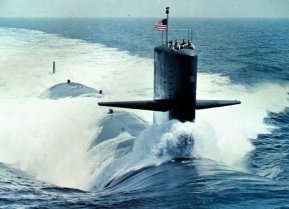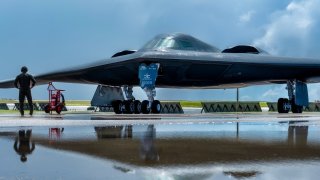Iran’s Nuclear Program Can’t Be Bombed Out of Existence
To paraphrase Machiavelli, prudence involves choosing the least of the worst options. And in this case, Israel’s and America’s least-worst option is avoiding preemptive strikes on Iran’s nuclear facilities.
The Middle East is on the brink of full-scale regional war. Israel recently launched retaliatory strikes against Iran. While Israel avoided targeting Iran’s nuclear and oil facilities, there is still a risk that Israel’s and Iran’s back-and-forth missile strikes will drag the United States into yet another war in the Middle East.

An array of individuals, such as former prime minister Naftali Bennett and John Bolton, have encouraged—and continue to encourage—Israel’s military to attack Iran’s nuclear capabilities. With the JCPOA dead in the water, hawks argue that Israel’s only option for stopping Iran from getting a nuclear weapon is war. However, the arguments in favor of a strike against Iran’s nuclear capabilities are misplaced. An attack would not set the program back dramatically and would likely convince Iran that it needs nuclear weapons to be secure. At the end of the day, while Iran acquiring nuclear capabilities is not ideal, it would not spell disaster for Israel or the United States.
Supporters of preemptively striking Iran grossly overestimate Israel’s ability to destroy all of Iran’s nuclear capabilities. Military intelligence is always imperfect, making it unlikely that Israel could know where all of Iran’s nuclear capabilities are located. For instance, Iran has likely dispersed its nuclear research technology and centers across the country to make targeting more difficult. Though Iran only has two enrichment sites capable of enriching its uranium to levels needed to possess a nuclear weapon, Iran has hardened its nuclear facilities—with at least one buried so deep underground that even U.S. airstrikes would be unlikely to destroy it. This makes detecting and destroying these nuclear capabilities more difficult for Israel and would require U.S. participation to have a higher chance of destroying them.
Even in the highly unlikely scenario that Israel destroyed all of Iran’s nuclear capabilities, Iran would still maintain the necessary know-how for nuclear weapons construction. This is the same reason why nuclear weapons will never go away; the absence of a nuclear weapon doesn’t eliminate a country’s ability to build one. If Israel tried to denuclearize Iran by force, it would convince Tehran the only way to be truly secure is to acquire a nuclear arsenal—the great equalizer in international politics.
Supporters of Israel’s strikes on Iran’s nuclear facilities also argue that Tehran would use a nuclear weapon to destroy Israel. Looking at Iran’s past rhetoric on its hope for the destruction of Israel, it’s easy to see why many worry about this. However, it is worth examining Iran’s behavior in addition to its rhetoric. Power—especially military power—places constraints even on the most zealous nations and leaders. Israel possesses enough nuclear weapons for a secure second-strike capability against Iran. This situation would hold Iran’s survival at risk and deter it from launching a nuclear strike against Israel. Iran’s behavior strongly suggests it would not start a war in which its demise was certain.
Finally, those who support preemptive strikes against Iran also claim that Iran would use their nuclear arsenal as nuclear blackmail as a deterrent to regime change, allowing it to take more risks with its conventional forces and proxies. As Kenneth Waltz wrote, “A big reason for America’s resistance to the spread of nuclear weapons is that if weak countries have some, they will cramp our style.”
However, this argument falls flat in the face of military capabilities and realities on the ground. Looking at Iran’s conventional weapons, it could not win a drawn-out war against Israel, and it could not dominate the Middle East. Iran’s proxies don’t provide much help either, as Israel is currently attacking them, and they are purchasing little political power for Tehran beyond a layer of deterrence. Israel’s decapitation of Hezbollah’s and Hamas’ leaders only heightens Tehran’s fear and its incentives to get a nuclear weapon.
None of this suggests that the world should simply disregard concerns over a nuclear Iran. These weapons are the most destructive in human history, and we have to be wary when any new nuclear actor enters the scene. But to paraphrase Machiavelli, prudence involves choosing the least of the worst options. And in this case, Israel’s and America’s least-worst option is avoiding preemptive strikes on Iran’s nuclear facilities.

About the Author
Benjamin D. Giltner is a DC-based defense and foreign policy analyst. He earned a Master’s of International Affairs from the George H.W. Bush School of Government and Public Service at Texas A&M University. His research interests include U.S. military strategy and force posture, great power competition, and nuclear deterrence.
Image: Andreas Zeitler / Shutterstock.com.


